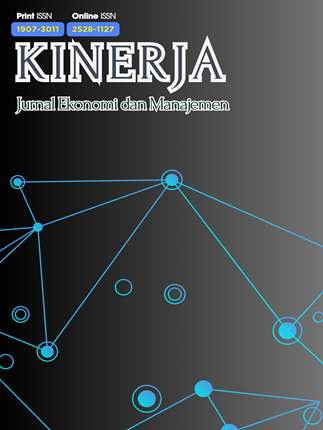Tim virtual global: systematic literature review
DOI:
https://doi.org/10.30872/jkin.v20i4.14258Keywords:
Tim virtual global, kepercayaan, efektivitas, kinerja, systematic literature reviewAbstract
Penelitian ini bertujuan untuk meneliti perihal tim virtual global. Kajian literatur digunakan dalam penelitian ini. Penelitian ini membagi menjadi 3 pembahasan yaitu: definisi, anteseden, dan konsekuensi dari tim virtual global. Definisi tim virtual global berfokus alat komunikasi. Sementara itu, Anteseden atau faktor-faktor yang mempengaruh kinerja tim virtual juga cukup banyak, diantaranya: kepemimpinan, komunikasi, kepercayaan, umpan balik, komitmen. Kepercayaan menjadi faktor terbanyak yang diteliti sebagai anteseden kinerja tim virtual global. Dan cukup banyak ditemukan variabel yang sama dengan yang digunakan antara konsekuensi dan anteseden dari global virtual juga cukup banyak, diantaranya: knowledge sharing, komunikasi, kepercayaan, dan hubungan. Adapun keterbatasan dalam penelitian ini yaitu kurang dalam membahas mengenasi tim kohesi, sehingga penelitian selanjutnya diharapkan mampu meneliti faktor tersebut.
References
Barry, P., & Kane, B. (2023). Global Virtual Team Working during the Covid-19 Pandemic. Interacting with computers.
Cho, V., Roll, L. C., Wu, C. H., & Tang, V. (2021). Changing Digital Age in the Wake of COVID-19: How Does Humility Impact on Virtual Leaderless Teams?. Journal of Global Information Management (JGIM), 30(4), 1-23
Darimi, I. (2017). TEKNOLOGI INFORMASI DAN KOMUNIKASI SEBAGAI MEDIA. Pendidikan Teknologi Informasi.
Deloitte (2020). www2.deloitte.com/content/dam/Deloitte/de/Documents/human-capi tal/Remote-Collaboration-COVID-19.pdf
Flavian, C., Guinalíu, M., & Jordan, P. (2019). Antecedents and consequences of trust on a virtual team leader. European Journal of Management and Business Economics, 28(1), 2–24. https://doi.org/10.1108/EJMBE-11-2017-0043
Flavián, C., Guinalíu, M., & Jordán, P. (2022). Virtual teams are here to stay: How personality traits, virtuality and leader gender impact trust in the leader and team commitment. European Research on Management and Business Economics, 28(2). https://doi.org/10.1016/j.iedeen.2021.100193
Fleischmann, C., Cardon, P. W., & Aritz, J. (2020, January). Smart Collaboration in Global Virtual Teams: The Influence of Culture on Technology Acceptance and Communication Effectiveness. In HICSS (pp. 1-11).
Gajendran, R. and Harrison, D. (2007), The Good, the Bad, and the Unknown about Telecommuting: Meta-analysis
Hoof, B. V. D & De Ridder, JA. (2004). Knowledge sharing in Context: The Influence of Organizational Commitment, Communication Climate Use on Knowledge sharing. Journal of Knowledge Management, 8 (6), 117-130.
Jannah, M., Nugroho, S. S., & Gitosudarmo, I. (2019). Peran Keterlibatan Produk Dalam Memoderasi Hubungan Antara Kualitas Layanan Daring Terhadap Kepuasan Daring. Buletin Studi Ekonomi, 24(2), 288–303.
Kapur, K., Paul, R., & Gupta, R. K. (2013). Personality and its impact on global virtual team performance. International Journal of Indian Culture and Business Management, 6(4), 410. https://doi.org/10.1504/ijicbm.2013.054251
Lauring, J., Drogendijk, R., & Kubovcikova, A. (2022). The role of context in overcoming distance-related problems in global virtual teams: an organizational discontinuity theory perspective. International Journal of Human Resource Management, 33(21), 4251–4283. https://doi.org/10.1080/09585192.2021.1960584
Liman, W., & Idulfilastri, R. M. (2022). Peran Kolaborasi Sebagai Mediator Pada Hubungan Knowledge Sharing Dengan Efektivitas Tim Virtual. Jurnal Muara Ilmu Sosial, Humaniora, Dan Seni, 6(1), 157. https://doi.org/10.24912/jmishumsen.v6i1.15436.2022
Magnusson, P., Schuster, A., & Taras, V. (2014). A process-based explanation of the psychic distance paradox: Evidence from global virtual teams. Management international review, 54, 283-306.
Marlow, S. L., Lacerenza, C. N., & Salas, E. (2017). Communication in virtual teams: A conceptual framework and research agenda. Human resource management review, 27(4), 575-589.
Maznevski, M. L., Chudoba, K. M., & Robey, D. (2000). Bridging Space Over Time: Global Virtual Team Dynamics and Effectiveness (Vol. 11, Issue 5).
Mulyani. (2016). Tim Virtual ……..( Mulyani) Buletin Bisnis & Manajemen. 02(02), 1–16.
Nur’aiini, L. F., & Arifin, B. S. (2021). PERAN TEKNOLOGI INFORMASI DAN KOMUNIKASI (Efektifitas dan Potensi Kinerja Kelompok). Journal of Islamic Science, Culture, and Social Studies, 1(2), 32–45.
Observe Research Fundation (2020). www.orfonline.org/expert-speak/covid19-technology-dependence-and-stress-in-workers/
Pasaribu, J., & Anshori, M. I. (2021). Penerapan Work From Home Terhadap Produktivitas Kerja (Studi Karyawan PT Berlian Jasa Terminal Indonesia). INOBIS: Jurnal Inovasi Bisnis Dan Manajemen Indonesia, 4(3), 409–423. https://doi.org/10.31842/jurnalinobis.v4i3.193
Paul, R., Drake, J. R., & Liang, H. (2016). Global Virtual Team Performance: The Effect of Coordination Effectiveness, Trust, and Team Cohesion. IEEE Transactions on Professional Communication, 59(3), 186–202. https://doi.org/10.1109/TPC.2016.2583319
Powell, A., Piccoli, G. and Ives, B. (2004) ‘Virtual teams: a review of current literature and directions for future research’, The DATABASE for Advances in Information Systems, Vol. 35, No. 1, pp.6–36.
Puspitasari, K., Hendriani, W., Profesi, M. P., Psikologi, F., Airlangga, U., Psikologi, D., Psikologi, F., & Airlangga, U. (2019). 5347-29632-1-Pb (11). 4.
Robert Jr, L. P. (2016, February). Monitoring and trust in virtual teams. In Proceedings of the 19th ACM Conference on Computer-Supported Cooperative Work & Social Computing (pp. 245-259).
Safrizal, H. B. A. (2022). Kepemimpinan Transformasioal Motivasi Kerja dan Kinerja Pegawai (Suyono, Ed.). Eureka Media Aksara.
Topaloglu, M., & Anac, A. S. (2021). Exploring Major Factors Affecting Virtual Team Performance. European Journal of Business and Management Research, 6(5), 107–114. https://doi.org/10.24018/ejbmr.2021.6.5.1071
Ünal, B. C. (2023). Influencing Factors of Team Effectiveness in Global Virtual Teams. International Journal of Interactive Communication Systems and Technologies, 12(1), 1–17. https://doi.org/10.4018/ijicst.320522
Wahyudi, A., Bhismi, M., Assyamiri, T., Al Aluf, W., Fadhillah, M. R., Yolanda, S., & Anshori, M. I. (2023). Dampak Transformasi Era Digital Terhadap Manajemen Sumber Daya Manusia. Jurnal Bintang Manajemen (JUBIMA), 1(4), 99–111. https://doi.org/
Zaky, M. (2023). Faktor-Faktor Yang Mempengaruhi Kinerja Tim Kerja: Sebuah Kajian Teoritis Dan Empiris. Komitmen: Jurnal Ilmiah Manajemen, 4(1), 316–326. https://doi.org/10.15575/jim.v4i1.25253


